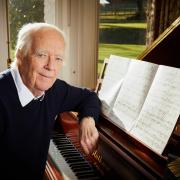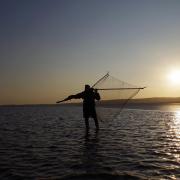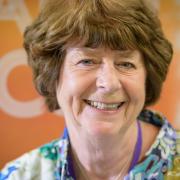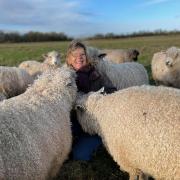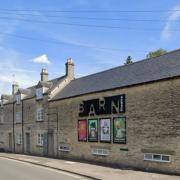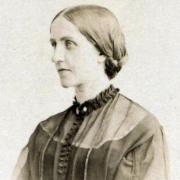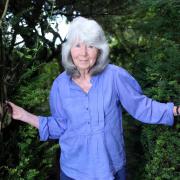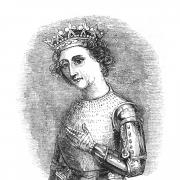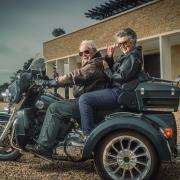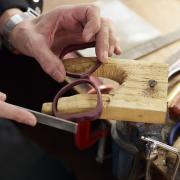An inspirational teacher, who spent much of her career at Blueboys, Minchinhampton, celebrates her 100th birthday this month. Katie Jarvis Catches up with her
WHEN Gladys Beale entered the world on August 16, 1907, England belonged to the Edwardians. Art Nouveau dominated architecture, style and fashion; Shaw, Kipling, Conrad and HG Wells were kings of literature; and the Wright brothers had just developed the world's first practical fixed-wing aircraft.
It would be another 11 years even before females over 30 were allowed a political voice, but the world was opening up. Gladys Beale was born into an era of vast new possibilities for women - as her own life richly demonstrates. As she looks back through an incredible 100 years of experiences, Miss Beale can reflect on a career of inspirational teaching, much of it spent at Blueboys, the Minchinhampton School she founded and ran for 34 years. Past pupils who benefited from her steady, strict and caring education include Richard Lloyd-Morgan, now chaplain at King's College, Cambridge; Sir Robin Janvrin, Private Secretary to the Queen; Sir Tristram Ricketts, chief executive of the Horserace Betting Levy Board; Jyl Rhys-Jones, aunt to the Duchess of Wessex; and the Princess Royal's children, Zara and Peter Phillips.
They, and many others, have no hesitation in thanking Miss Beale for the first class start in life she provided them with. But she too has her thanks to offer - to her great aunt, Dorothea Beale, an educational pioneer and leading member of the women's suffrage movement that eventually helped secure the vote.
"There is no doubt that Aunt Dorothea was one of the people who very much improved the lives of women," Miss Beale agrees. "Before her, the sort of girls to benefit from a good education were those whose fathers were parsons, who could teach them Greek and Latin; they had very few examples."
Dorothea, who died the year before Gladys Beale was born, was an English teacher who founded St Hilda's College, Oxford. As head of Cheltenham Ladies' College, she endowed the school with the qualities which led to it becoming a leader in the educational field. She also helped form the London Society for Women's Suffrage, attracting supporters such as John Stuart Mill in her attempts to persuade Parliament to grant women the vote.
She would have been proud to think her own great niece, many decades later, would still be carrying on the good work.
"It is interesting to see how teaching and education have run in my family," Miss Beale explains. "I still have a great niece who is a teacher today. I, however, was not sent to Cheltenham Ladies' myself because my parents thought it would be too much of a disadvantage. I always found it amusing that, when my aunt was headmistress, anyone could go to the Ladies' College if their father was in trade, but NOT if they had their name above the shop!
"I was sent to St Mary's Calne."
Though celebrating a century, Miss Beale retains a razor-sharp mind and an excellent memory; she's active in the community and a regular worshipper at Holy Trinity, Minchinhampton.
One of four children, she was born in Wimbledon, but moved to Minchinhampton in 1921 at the age of 14, thrilled at the idea of living in the country. She was already familiar with the Cotswold market town because her grandfather owned Hyde Court, where the highlight of her visits was tea with the maids through the green baize door. "When we first came down, we had bicycles, of course, and a pony and trap. In those days, your friends were all at the end of a bike ride - we knew very few people on the other side of the hill. Nobody had a car except for Dr Brown."
She remembers reading about the Mitfords ("All the exciting bits were in the News of the World, but my father wouldn't allow that paper in the house"), and working on the fields during the war, unpaid but for a lunch of bread and cheese.
She began training as a teacher at Oakley Hall, a former independent school in Cirencester, before moving to another school, St Neots, Eversley, near Reading. "One of the saddest things for me is that practically all the boys I taught before the Second World War were killed fighting."
It was in 1942, after her father died, that she decided to return home to open her own school at her mother's house just off Minchinhampton Common. It was named Blueboys after the Minchinhampton lads who once worked in the wool industry, stirring the vats where the cloth was dyed blue.
Starting with just eight children, she began to put into practice her own very definite views on education; by the time she retired in 1976, there were 60 pupils on the roll.
"In those days, it was up to me what I taught them; and that's how it should be. It's not good to interfere. We had a schedule for the term, of course, but good teachers were allowed to get on with their jobs. Now, I'm told, you have to say exactly what you are going to teach: we were able to be much freer. If we were giving a history lesson and a child asked a question, we could go off into something different, which was inspiring to both pupils and teacher.
"At one school where I taught, the maths master was an expert on birds and could teach the boys all about them. Because they liked the master, they were all good at maths.
"I wouldn't like to teach now for all the tea in China, because of the regulations."
In Miss Beale's classes, the children would learn a poem off by heart each week. And during the annual plays they put on in the grounds, nearby Aston Down airfield would make sure no disruptive aircraft flew over.
Nor were there anything like the current health regulations. Healthy school meals, cooked by a Mrs Merrett who still lives in nearby Butt Street, would be pushed over in a covered pram.
Among Miss Beale's particularly treasured memories is welcoming the four grandchildren of Sir Stafford Cripps as pupils to the school, two of whom had a Ghanaian father. They very quickly settled down.
In spite of her belief that education has not benefited from changes over the years, she does have great admiration for Minchinhampton Primary School and its current head, Rod Harris. "When the tsunami happened, he asked the children to give up one of their Christmas presents to be sold off to raise funds, which many of them willingly did. I thought that was a wonderful thing to do."
There have been various Blueboys reunions over the years, but the biggest yet is planned for Sunday, September 2 at Beaudesert Park School in Minchinhampton, which will welcome more than 120 of Miss Beale's former pupils. And she's adamant the party will go ahead, whether she's there to celebrate or not. Guests will relish the opportunity to talk over old times and mark their former headmistress's very special birthday - doubtless with some incredulity.
They're not the only ones who can't quite believe this clever, independent lady has really reached her centenary.
"I was about to walk back from church in the dark one evening, when a lady stopped me to say, 'You're not really going to go back alone!'" Miss Beale says. "I told her I'd been walking through the streets of Minchinhampton on my own for more than 80 years - even during the night when I was air raid warden during the war - and I certainly wasn't going to stop now."
WHEN Gladys Beale entered the world on August 16, 1907, England belonged to the Edwardians. Art Nouveau dominated architecture, style and fashion; Shaw, Kipling, Conrad and HG Wells were kings of literature; and the Wright brothers had just developed the world's first practical fixed-wing aircraft.
It would be another 11 years even before females over 30 were allowed a political voice, but the world was opening up. Gladys Beale was born into an era of vast new possibilities for women - as her own life richly demonstrates. As she looks back through an incredible 100 years of experiences, Miss Beale can reflect on a career of inspirational teaching, much of it spent at Blueboys, the Minchinhampton School she founded and ran for 34 years. Past pupils who benefited from her steady, strict and caring education include Richard Lloyd-Morgan, now chaplain at King's College, Cambridge; Sir Robin Janvrin, Private Secretary to the Queen; Sir Tristram Ricketts, chief executive of the Horserace Betting Levy Board; Jyl Rhys-Jones, aunt to the Duchess of Wessex; and the Princess Royal's children, Zara and Peter Phillips.
They, and many others, have no hesitation in thanking Miss Beale for the first class start in life she provided them with. But she too has her thanks to offer - to her great aunt, Dorothea Beale, an educational pioneer and leading member of the women's suffrage movement that eventually helped secure the vote.
"There is no doubt that Aunt Dorothea was one of the people who very much improved the lives of women," Miss Beale agrees. "Before her, the sort of girls to benefit from a good education were those whose fathers were parsons, who could teach them Greek and Latin; they had very few examples."
Dorothea, who died the year before Gladys Beale was born, was an English teacher who founded St Hilda's College, Oxford. As head of Cheltenham Ladies' College, she endowed the school with the qualities which led to it becoming a leader in the educational field. She also helped form the London Society for Women's Suffrage, attracting supporters such as John Stuart Mill in her attempts to persuade Parliament to grant women the vote.
She would have been proud to think her own great niece, many decades later, would still be carrying on the good work.
"It is interesting to see how teaching and education have run in my family," Miss Beale explains. "I still have a great niece who is a teacher today. I, however, was not sent to Cheltenham Ladies' myself because my parents thought it would be too much of a disadvantage. I always found it amusing that, when my aunt was headmistress, anyone could go to the Ladies' College if their father was in trade, but NOT if they had their name above the shop!
"I was sent to St Mary's Calne."
Though celebrating a century, Miss Beale retains a razor-sharp mind and an excellent memory; she's active in the community and a regular worshipper at Holy Trinity, Minchinhampton.
One of four children, she was born in Wimbledon, but moved to Minchinhampton in 1921 at the age of 14, thrilled at the idea of living in the country. She was already familiar with the Cotswold market town because her grandfather owned Hyde Court, where the highlight of her visits was tea with the maids through the green baize door. "When we first came down, we had bicycles, of course, and a pony and trap. In those days, your friends were all at the end of a bike ride - we knew very few people on the other side of the hill. Nobody had a car except for Dr Brown."
She remembers reading about the Mitfords ("All the exciting bits were in the News of the World, but my father wouldn't allow that paper in the house"), and working on the fields during the war, unpaid but for a lunch of bread and cheese.
She began training as a teacher at Oakley Hall, a former independent school in Cirencester, before moving to another school, St Neots, Eversley, near Reading. "One of the saddest things for me is that practically all the boys I taught before the Second World War were killed fighting."
It was in 1942, after her father died, that she decided to return home to open her own school at her mother's house just off Minchinhampton Common. It was named Blueboys after the Minchinhampton lads who once worked in the wool industry, stirring the vats where the cloth was dyed blue.
Starting with just eight children, she began to put into practice her own very definite views on education; by the time she retired in 1976, there were 60 pupils on the roll.
"In those days, it was up to me what I taught them; and that's how it should be. It's not good to interfere. We had a schedule for the term, of course, but good teachers were allowed to get on with their jobs. Now, I'm told, you have to say exactly what you are going to teach: we were able to be much freer. If we were giving a history lesson and a child asked a question, we could go off into something different, which was inspiring to both pupils and teacher.
"At one school where I taught, the maths master was an expert on birds and could teach the boys all about them. Because they liked the master, they were all good at maths.
"I wouldn't like to teach now for all the tea in China, because of the regulations."
In Miss Beale's classes, the children would learn a poem off by heart each week. And during the annual plays they put on in the grounds, nearby Aston Down airfield would make sure no disruptive aircraft flew over.
Nor were there anything like the current health regulations. Healthy school meals, cooked by a Mrs Merrett who still lives in nearby Butt Street, would be pushed over in a covered pram.
Among Miss Beale's particularly treasured memories is welcoming the four grandchildren of Sir Stafford Cripps as pupils to the school, two of whom had a Ghanaian father. They very quickly settled down.
In spite of her belief that education has not benefited from changes over the years, she does have great admiration for Minchinhampton Primary School and its current head, Rod Harris. "When the tsunami happened, he asked the children to give up one of their Christmas presents to be sold off to raise funds, which many of them willingly did. I thought that was a wonderful thing to do."
There have been various Blueboys reunions over the years, but the biggest yet is planned for Sunday, September 2 at Beaudesert Park School in Minchinhampton, which will welcome more than 120 of Miss Beale's former pupils. And she's adamant the party will go ahead, whether she's there to celebrate or not. Guests will relish the opportunity to talk over old times and mark their former headmistress's very special birthday - doubtless with some incredulity.
They're not the only ones who can't quite believe this clever, independent lady has really reached her centenary.
"I was about to walk back from church in the dark one evening, when a lady stopped me to say, 'You're not really going to go back alone!'" Miss Beale says. "I told her I'd been walking through the streets of Minchinhampton on my own for more than 80 years - even during the night when I was air raid warden during the war - and I certainly wasn't going to stop now."



